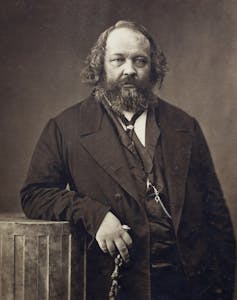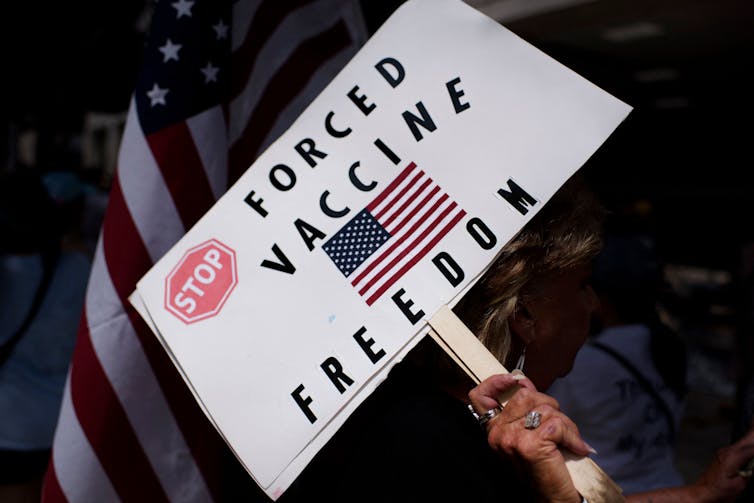Why a 19th-century Russian anarchist is relevant to the mask and vaccine debate
- Written by Michael Locke McLendon, Professor of Political Science, California State University, Los Angeles
Americans who refused to don masks or get vaccinated during the pandemic don’t have an easy task constructing a valid philosophical defense of their behavior.
The go-to philosophical[1] authorities typically cited[2] to defend individual liberty in the U.S. – John Locke and John Stuart Mill – do not provide compelling reasons for ignoring public health messages.
Locke’s doctrine of natural law[3] states that people are endowed with natural rights[4] to “life, liberty, and estate,” premised on duties to God of self-preservation, and any behavior that risks survival constitutes a violation of that natural law[5]. As such, there is no justification to refuse a safe and effective vaccine during a deadly pandemic.
Similarly, Mill’s “harm principle[6]” – which broadly states that people are allowed to do whatever they want provided they do not directly harm others – doesn’t help those opposed to vaccines and masks. Their actions might prolong the pandemic[7], allowing the virus an opportunity to mutate and potentially render vaccines ineffective[8] – behavior that puts everyone at risk.
There is, however, another ethical framework that people refusing to be vaccinated or wear masks might turn to, although it comes from an unlikely source: the 19th-century Russian anarcho-communist Mikhail Bakunin[9].
Perhaps most famous for his lengthy and bitter tiff with German philosopher Karl Marx[10], Bakunin’s philosophy of anarcho-communism consisted of the abolition of government, private property and indeed all means of coercion.
 Revolutionary anarchist Mikhail Bakunin.
Fine Art Images/Heritage Images/Getty Images[11]
Revolutionary anarchist Mikhail Bakunin.
Fine Art Images/Heritage Images/Getty Images[11]
As a professor of political theory[12], I believe Bakunin has been overlooked in the current debate about masks and vaccines. Some of his views are consistent with at least the libertarian-based criticisms[13] of mask and vaccine requirements. Indeed, despite meaningful differences, many libertarians in the U.S. share with Bakunin the belief that freedom is the most important value[14] and governments are by nature coercive. They may distrust Bakunin’s insistence on linking freedom and rationality and certainly would reject his embrace of communism, but libertarians would likely nevertheless admire his skepticism of authority.
Science as a threat to freedom
Bakunin might not be an obvious source of support for many in the anti-mask and anti-vaccine camp. His classic 1871 text, “God and State[15],” begins in a manner sure to offend certain elements of the religious right, who make up a sizable number of those refusing to follow public health advise on vaccines[16].
Bakunin attacks Christianity as the enemy of rationality and freedom[17]. If humans wish to be free, he argues, they should learn the physical laws of the universe and social laws of society to inform their decision-making. If guided by genuine knowledge, Bakunin says, people can make smart decisions and become rational agents in charge of making choices for themselves.
But science, too, can be a great threat to freedom[18], Bakunin suggests – and it is here that many of those opposed to mask and vaccine mandates may warm to his argument.
Beyond the fact that there are limits to scientific knowledge, Bakunin believed that there is always the possibility that scientists themselves will be invested with coercive authority[19].
If rationality and knowledge are requisite for freedom, Bakunin argued, then those with knowledge are in a position to force people to do, or not do, certain things.
As such, Bakunin worried that scientists, emboldened by their importance in society, will “arrogantly claim the right to govern life[20].”
“We must respect the scientists for their merits and achievements, but in order to prevent them from corrupting their own high moral and intellectual standards, they should be granted no special privileges and no rights other than those possessed by everyone – for example, the liberty to express their convictions, thought and knowledge. Neither they nor any other special group should be given power over others. He who is given power will inevitably become an oppressor and exploiter of society,” he wrote[21] in 1873.
Skeptical consumers of knowledge
Bakunin’s solution to the risk of coercion by scientists was to lessen their authority without diminishing the value of scientific knowledge. To do so, he makes each individual responsible for learning and acting on whatever knowledge they have. The idea is for people to consult scientists for knowledge with the understanding that no one scientist has all the answers and that the accumulated knowledge of all scientists likewise is limited and cannot give perfect answers.
To apply Bakunin’s theory of freedom to pandemic America, no one should be required to get a vaccine. Rather, the population should be encouraged to investigate the efficacy and safety of the vaccines.
 Protesters cast vaccines as an attack on their freedom.
Mark Felix/AFP via Getty Images)[22]
Protesters cast vaccines as an attack on their freedom.
Mark Felix/AFP via Getty Images)[22]
For its part, the scientific community needs to vigilantly scrutinize itself and present knowledge in an honest fashion, eagerly volunteering to the public what it knows and does not know.
Bakunin would be highly critical of both naïve optimists and doom-and-gloom pessimists in the scientific community. People need the unvarnished truth presented in simple and clear terms. If the answer is “we scientists don’t know,” then so be it.
Ask questions … but be reasonable
Bakunin’s theory of freedom asks much of the population. It requires individuals to know something of the nature of scientific knowledge, ask sensible questions and then make a rational analysis of the available evidence. It requires scientists to check their egos and desire for quick celebrity and soberly present their knowledge in accessible and honest terms.
And granted, Bakunin did not account for disinformation campaigns[23] of the sort found on the internet that undermine access to reliable scientific data. He did, however, have faith in people to sort through information and make rational decisions. This ability, according to Bakunin, is a precondition for freedom.
Vaccine skeptics, thus, might find comfort in Bakunin. If they ask good questions and do not find satisfactory answers, then his philosophy suggests they should absolutely refuse a vaccine. The same goes for masking: If the scientific community cannot effectively communicate why masks are still needed, then people should not be expected to wear them, Bakunin might argue.
At the same time, those opposing masks and vaccines need to sincerely follow the science and allow themselves to be convinced by data, Bakunin’s philosophy suggests. Refusing to wear a mask based on an uneducated hunch or because of a belief that the “government wants to control me” constitutes folly, not freedom. In short, anti-vaxxers and anti-maskers, to claim their freedom, need to be reasonable.
[Get our best science, health and technology stories. Sign up for The Conversation’s science newsletter[24].]
References
- ^ go-to philosophical (doi.org)
- ^ authorities typically cited (www.mtsu.edu)
- ^ doctrine of natural law (plato.stanford.edu)
- ^ endowed with natural rights (plato.stanford.edu)
- ^ violation of that natural law (plato.stanford.edu)
- ^ harm principle (ethics.org.au)
- ^ prolong the pandemic (www.cnbc.com)
- ^ potentially render vaccines ineffective (www.oxfam.org)
- ^ Mikhail Bakunin (www.marxists.org)
- ^ lengthy and bitter tiff with German philosopher Karl Marx (doi.org)
- ^ Fine Art Images/Heritage Images/Getty Images (www.gettyimages.com)
- ^ professor of political theory (scholar.google.com)
- ^ libertarian-based criticisms (www.npr.org)
- ^ freedom is the most important value (plato.stanford.edu)
- ^ God and State (dwardmac.pitzer.edu)
- ^ those refusing to follow public health advise on vaccines (www.pewresearch.org)
- ^ the enemy of rationality and freedom (dwardmac.pitzer.edu)
- ^ great threat to freedom (www.marxists.org)
- ^ scientists themselves will be invested with coercive authority (www.marxists.org)
- ^ arrogantly claim the right to govern life (www.marxists.org)
- ^ he wrote (www.marxists.org)
- ^ Mark Felix/AFP via Getty Images) (www.gettyimages.com)
- ^ disinformation campaigns (www.washingtonpost.com)
- ^ Sign up for The Conversation’s science newsletter (theconversation.com)

















